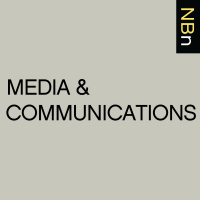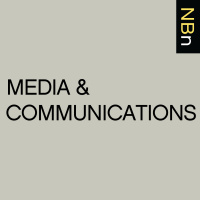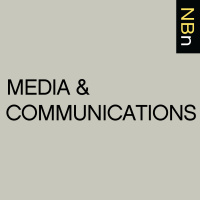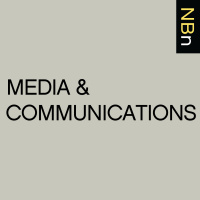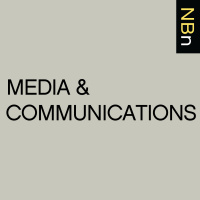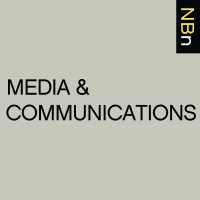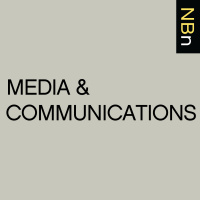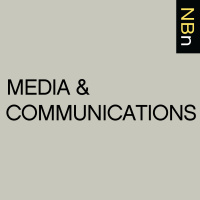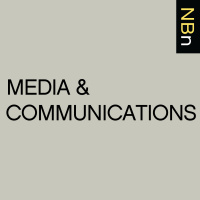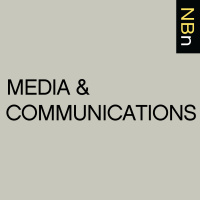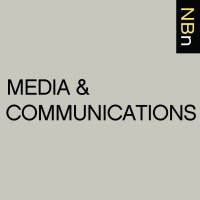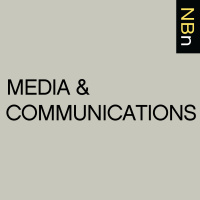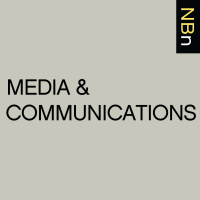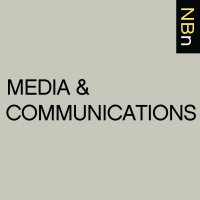Synopsis
Interviews with Scholars of Media and Communications about their New Books
Episodes
-
David Beer, “Popular Culture and New Media: The Politics of Circulation” (Palgrave, 2013)
21/09/2013 Duration: 38minPopular Culture and New Media: The Politics of Circulation (Palgrave, 2013) is written by David Beer, a Senior Lecturer in Sociology at York University in the UK. He blogs here and tweets here. The book attempts to describe and analyse the impact of new media on culture and society, using a range of critical theoretical starting points. Its use of theory is especially important to such a fast moving topic. The book aims to have continued and longer term relevance to debates about culture, even as specific technologies come and go, as a result of its theoretical basis David’s book raises a series of challenges for a range of academic areas. Perhaps the most important is the impact of media communications on the sociology of culture. Sociological studies of culture have been slow to consider the impact of new media, as they have tended to focus on debates about the relationship between tastes and class or social status. Popular Culture and New Media argues that the architecture underlying the way many people a
-
Sarah Banet-Weiser, “Authentic: The Politics of Ambivalence in a Brand Culture” (NYU Press, 2013)
27/08/2013 Duration: 57minIn Authentic: The Politics of Ambivalence in a Brand Culture (NYU Press, 2013), Sarah Banet-Weiser scrutinizes the spread of brand culture into other spheres of social life that the market–at least in our imaginations–had left untouched: politics, religion, creativity, and the self. Banet-Weiser observes that the authenticity concept seems to carry more weight in a culture of selling: We have come to expect, and to some extent accept, that authenticity, like everything else, can be trademarked. Through rich case studies–Dove ad campaigns, Facebook self-performance, street art, green activism, and New Age spirituality among them–Authentic identifies the pervasive (and often troubling) ambivalence of branded living. Learn more about your ad choices. Visit megaphone.fm/adchoices
-
Brian Michael Goss, “Rebooting the Herman and Chomsky Propaganda Model in the Twenty-First Century” (Peter Lang, 2013)
22/07/2013 Duration: 44minBrian Michael Goss, professor of communication at St. Louis University in Madrid, has taken one of media’s most studied theories and given it a facelift. In Rebooting the Herman and Chomsky Propaganda Model in the Twenty-First Century (Peter Lang, 2013), Goss revisits the model created by Edward Herman and Noam Chomsky in their 1988 book, Manufacturing Consent. The filters remain, but Goss pushes the model into the modern context of new media models and expanded global exportation. “Far from condemning journalism,” Goss writes, “I hope to see it more closely approximate its mythologies about itself.” “Rebooting” is an important work, relevant not just to scholars, but all consumers of media. Learn more about your ad choices. Visit megaphone.fm/adchoices
-
John O. McGinnis, “Accelerating Democracy: Transforming Governance Through Technology” (Princeton UP, 2013)
10/07/2013 Duration: 01h01minThe advent of very powerful computers and the Internet have not “changed everything,” but it has created a new communications context within which almost everything we do will be somewhat changed. One of the “things we do” is governance, that is, the way we organize ourselves politically and, as a result of that organization, provide for the individual and public good. In his fascinating book Accelerating Democracy: Transforming Governance Through Technology (Princeton UP, 2013), John O. McGinnis examines the promise and peril of advanced computation and Internet communications for our democracy. The former (promise), he says, is great if we think deeply about the impact of the new media on politics and public policy. He proposed that we take the bull by the horns and experiment with new technology so that governance can become both more democratic and more efficient. He suggests a number of ways in which the potential of the new media can be made to do just this. Listen in. Learn more about your ad choices.
-
Michael Serazio, “Your Ad Here: The Cool Sell of Guerrilla Marketing” (NYU Press, 2013)
03/07/2013 Duration: 58min“Power through freedom.” Michael Serazio‘s Your Ad Here: The Cool Sell of Guerrilla Marketing (NYU Press, 2013) traces the mushrooming world of guerrilla marketing–defined to include word-of-mouth, viral, and advergaming, along with a host of other, often hidden kinds of persuasion. The book describes the ways that advertisers give up “control” to consumers through “authentic” discovery, dialogue, amateurism, the non-sell sell, and even anti-marketing messages themselves–all of which serve, paradoxically, to reinforce control and commercialism. The consumer subject, writes Serazio drawing on Foucault and Gramsci, is strategically engaged to act without the sense of being acted upon–a kind “corporate ventriloquism.” The book includes rich, detailed case studies and interviews with marketers, who recount their “cool sell” campaigns for America’s Army, PBR, and Burger King’s “Subservient Chicken.” Learn more about your ad choices. Visit megaphone.fm/adchoices
-
Nicco Mele, “The End of Big: How the Internet Makes David the New Goliath” (St. Martin’s Press, 2013)
24/06/2013 Duration: 37minNicco Mele is the author of The End of Big: How the Internet Makes David the New Goliath (St. Martin’s Press, 2013). He is Adjunct Lecturer in Public Policy at the Kennedy School’s Shorenstein Center on the Press, Politics, and Public Policy, Harvard University. Mele writes as a technology expert and as a witness to history. He served as a campaign staffer for the Howard Dean for President Campaign in 2003. He and his colleagues implemented many of the web-based campaign innovations that resulted in President Obama winning the 2008 presidential election and define the modern American political campaign. Mele links that experience with radical social changes brought about by the internet. His title thesis, The End of Big, suggest that big institutions in nearly every sector of our lives (business, government, news) have been eroded and, in some cases, supplanted by smallness. An enthusiast for technology, Mele also cautions against the risks associated with this transformation. Learn more about your ad choices
-
Dominic Pettman, “Human Error” (UMinnesota, 2011)/”Look at the Bunny” (Zero Books, 2013)
31/05/2013 Duration: 01h15min“The humans are dead.” Whether or not you recognize the epigram from Flight of the Conchords (and if not, there are worse ways to spend a few minutes than by looking here, and I recommend sticking around for the “binary solo”), Dominic Pettman‘s Human Error: Species-Being and Media Machines (University of Minnesota Press, 2011) will likely change the way you think about humanity, animals, machines, and the relationships among them. Pettman uses a series of fascinating case studies, from television programs to films to Sufi fables to pop songs, to explore the notion of Agamben’s “anthropological machines” and the human being as a “technospecies without qualities” in a modern mediascape that includes Thomas Edison’s film Electrocuting an Elephant, Werner Herzog’s Grizzly Man, and the interplanetary soundscape created by NASA (among many, many others). We recently gathered over Skype to talk about some of the major thematic and argumentative threads snaking through this book and Pettman’s recent exploration of
-
Dan Kennedy, “The Wired City: Reimagining Journalism and Civic Life in the Post-Newspaper Age” (UMass Press, 2013)
29/05/2013 Duration: 44minDan Kennedy envisioned a massive book project, a big-picture investigation into current issues facing journalism and media. Instead he found everything he needed in New Haven, Conn., inside the small but productive office of the New Haven Independent. In The Wired City: Reimagining Journalism and Civic Life in the Post-Newspaper Age (University of Massachusetts Press, 2013), Kennedy, assistant professor of journalism at Northeastern University, researches models of journalism that engage public conversation while producing indispensable local news coverage. Although Kennedy’s work includes insight into numerous organizations, the book focuses primarily on the Independent, a non-profit institution in the historical town of New Haven that includes the New Haven Register, a publication that dates back more than two centuries Through interviews and research, Kennedy shows that local journalism in the 21st Century can survive and thrive so long as those within an organization are willing to put in the work and d
-
Douglas Rushkoff, “Present Shock: When Everything Happens Now” (Current, 2013)
21/05/2013 Duration: 34minHumans understand the world through stories, some short and some long. But what happens when the stories become so short that they, well, aren’t stories at all? In Present Shock: When Everything Happens Now (Current, 2013), Douglas Rushkoff explores this question. He points out that always-on, always “new” digital communications have essentially locked us into an ever-more data-rich “moment,” one from which we cannot really escape. The past becomes a few minutes ago; the future a few minutes hence. Of course it’s always always been “now” (as Buddhists will tell you), but now the “now” is far more captivating than ever before. What’s it all mean? Rushkoff explains. Learn more about your ad choices. Visit megaphone.fm/adchoices
-
Muzammil Hussain and Phillip Howard, “Democracy’s Fourth Wave? Digital Media and the Arab Spring” (Oxford UP 2013)
26/04/2013 Duration: 25minMuzammil Hussain and Phillip Howard have authored Democracy’s Fourth Wave? Digital Media and the Arab Spring (Oxford University Press, 2013) which explores the role social media (Twitter, Facebook, and texting) have played in political activism in Tunisia, Egypt, and Lebanon. Hussain is a new Assistant Professor of Global Media Studies at the University of Michigan and Phillip Howard is Professor of Communication, Information, and International Studies at the University of Washington. Through extensive data collection and fieldwork, the authors bring a multi-method and multi-disciplinary approach to their timely subject. They argue that digital activism typically travels through six steps of protest mobilization starting with capacity building and ends with post-protest information war. This is the third book from the Oxford Studies in Digital Politics series featured on the podcast. As with the previous, Political Scientists can learn a lot from the disciplinary perspective brought to the subject of activis
-
David Hochfelder, “The Telegraph in America, 1832-1920” (Johns Hopkins UP, 2012)
23/04/2013 Duration: 44minIn The Telegraph in America, 1832-1920 (Johns Hopkins University Press, 2012), David Hochfelder provides a taut and consistently intelligent history of the telegraph in American life. The book is notable for both its topical breadth—encompassing war, politics, business, journalism, and everyday life—as well as its focused, argument-driven chapters. Hochfelder describes how the telegraph’s important role in the Civil War set the stage for Western Union’s postwar dominance, which in turn provoked persistent efforts to nationalize and regulate telegraphy up through World War I. Hochfelder lingers on two of the telegraph’s principal clients, newspapers and businessmen, focusing in the latter case on the crucial importance of the telegraph-enabled stock “ticker” for modern financial capitalism. The book traces the telegraph’s effect not just on institutions but also the lived experience of ordinary people, who came to hunger for breaking news and real-time stock updates. The patterns of communication established b
-
Martin Kelner, “Sit Down and Cheer: A History of Sport on TV” (Bloomsbury, 2012)
15/04/2013 Duration: 51minI have never been to the Super Bowl, and I will probably never will. I’ve never been to a World Cup match or an Olympic event. I’ve never been to the Final Four or the Rose Bowl. I’ve never been to the Stanley Cup playoffs or the Champions League, the Kentucky Derby or the Masters. The only sporting event of consequence that I’ve ever attended was the World Series. It was game two of a series that went the full seven games. My team won that night, I remember. But I don’t recall much else. I was sitting in the top row, far away in the right-field corner. Certainly, it was fun to be there. But I would have seen more of the game if I had watched it on TV. The history of sports is typically told from the perspective of those who were there, at the stadium: the athletes and managers, the spectators, and the journalists who wrote the first accounts. But most fans watch the great events of sport not in person, but from the comfort of their living room sofa. Even when witnessed from this distance, the events are sti
-
Robert W. McChesney, “Digital Disconnect: How Capitalism is Turning the Internet Against Democracy” (The New Press, 2013)
04/04/2013 Duration: 47minRobert W. McChesney, the celebrated political economist of communication, takes the Internet, industry and government head-on in his latest book, Digital Disconnect: How Capitalism is Turning the Internet Against Democracy (The New Press, 2013). Digital Disconnect builds on McChesney’s previous works, spinning forward his scholarship to construct a remarkably current look at the Internet’s corporate and political landscape. “Almost all of the other books on the Internet, some of which are very good, sort of try to take a larger view of it,” McChesney says during the interview. “Because of where I’m coming from, because of my interests, I think that’s the one thing I could inject that draws from my past research, where I can speak with greater authority, that’s really not talked about by anyone else.” McChesney uses the book to argue that the Internet has become a hub of “numbing commercialism,” largely the result of failed government policies. Writes McChesney: “When the dust clears on this critical juncture,
-
Vicki Mayer, “Below the Line: Producers and Production Studies in the New Television Economy”
11/03/2013 Duration: 01h37sIn Below the Line: Producers and Production Studies in the New Television Economy (Duke University Press, 2011), Vicki Mayer provides a major theoretical contribution to media production studies. The book self-consciously challenges the idea of the “TV producer” that industry figures and scholars alike often assume. Mayer traces how the “TV producer” category came to be associated with–indeed defined by–creativity and professionalism. Below the Line upends this definition, through four empirical case studies of largely invisible television production: (1) television set assemblers in Brazil, (2) soft-core video cameramen in New Orleans, (3) reality TV casters, and (4) local cable television citizen regulators. The book weaves a theoretical thread through these ethnographic portraits that are themselves framed by political economic analysis of the industry and the broader economy. What once seemed stable–the idea that TV producers are above-the-line creative professionals–lies in elegantly written tatters by t
-
Henry Jenkins, Sam Ford, Joshua Green, “Spreadable Media: Creating Value and Meaning in a Networked Culture” (New York University Press, 2013)
09/03/2013 Duration: 52minIf it doesn’t spread, it’s dead This is the unifying idea of Henry Jenkins, Sam Ford, and Joshua Green’s new book, Spreadable Media: Creating Value and Meaning in a Networked Culture (New York University Press, 2013) Those six words – If it doesn’t spread, it’s dead – appear on the back cover, on the inside jacket, and in the very first paragraph of the book’s introduction. The authors focus on the new currencies of media, including user engagement and the rapid flow of information, while debunking the terms we’ve all learned to know and dread, such as “viral” and “Web 2.0.” Jenkins, Ford, and Green set an ambitious agenda, targeting not one but three audiences: media scholars, communication professionals, and those who create and share media and are interested in learning how media are changing because of it. “Perhaps the most impactful aspect of a spreadable media environment,” the authors write, “is the way in which we all now play a vital role in the sharing of media texts.” A review of Spreadable Me
-
C.W. Anderson, “Rebuilding the News: Metropolitan Journalism in the Digital Age” (Temple UP, 2013)
03/03/2013 Duration: 52minSomewhere along the line, C.W. Anderson became fascinated with digital journalism and the culture that surrounds it: engaged publics, social networks, and the challenges to “legacy” media. Rebuilding the News: Metropolitan Journalism in the Digital Age (Temple University Press, 2013) is the fascinating product of Anderson’s research into the Philadelphia journalism scene during the first decade-plus of the 21st Century. Once a thriving hub of traditional journalism, Philadelphia has become a living case study of the collision of digital media practices. Anderson’s ethnographic research and spot-on academic interpretation paints a vivid picture of a sometimes innovative, sometimes meandering journalism scene. Although we are at the beginning of the digital journalism era, in Rebuilding the News Anderson nonetheless walks us through the new ecosystem, what seems to be working, what doesn’t, and where we go from here. “Given all of the pain journalism has experienced in the past decade and a half,” Anderson w
-
Dennis Deninger, “Sports on Television: The How and Why Behind What You See” (Routledge, 2012)
20/02/2013 Duration: 50minDid you watch the game last night? No matter if you live in Australia, England, India, Ontario, or the US, chances are you’ve heard that question today. Televised sports are a constant presence in contemporary culture, providing a common set of experiences and references for people in the workplace, the airport terminal, the dormitory, and even, in the case of the World Cup and Olympics, around the world. As individuals, televised sport shapes our everyday speech and behaviors (anybody ever lift their arms in celebration and mimic the roar of the crowd after tossing trash in the bin?). Our life stories are punctuated by moments of watching sports. Among my own fondest memories are hours at the TV, watching hockey with my grandmother, soccer with my children, the Olympics with my wife, and, on one late winter night, the NFL playoffs with a crowd of American travelers in an East European pub. Whenever I catch the replay of a particular moment from an event I have watched years ago–say the closing seconds of th
-
Nick Couldry, “Media, Society, World: Social Theory and Digital Media Practice” (Polity Press, 2012)
04/02/2013 Duration: 01h03minIn Media, Society, World: Social Theory and Digital Media Practice (Polity Press, 2012), Nick Couldry provides a sweeping synthesis of his important media theory over the last decade. Couldry reassesses his work on media rituals, media power, and the “hidden injuries” of representation in light of cross-cultural diversity as well as the sudden eruption of social media. The book argues convincingly that these theories remain relevant to a social media age, in a rich, chapter-by-chapter engagement with contemporary social theory. Couldry makes a cogent case for a “practice approach” to media studies that treats a wide range of social activity–and not just production or consumption–as media-related and worthy of study. The book is concerned with big themes–social order, justice and power–but also furnishes a toolkit of mid-range theories that deserve to be applied, and wrestled with, in empirical research. Media, Society, World provides a nuanced verdict on the prospects of digital democracy, advances a de-terri
-
Barry Kernfeld, “Pop Song Piracy: Disobedient Music Distribution Since 1929” (University of Chicago Press, 2011)
17/05/2012 Duration: 01h09minHave you ever illegally downloaded a song from the internet? How about illicitly burned copies of a CD? Made a “party tape?” Bought a bootleg album? You may have done these things, but have you purchased a bootlegged song-sheet? In Pop Song Piracy: Disobedient Music Distribution Since 1929 (University of Chicago, 2011) Barry Kernfeld fills us in on the history of disobedient music reproduction and distribution since, well, before the advent of recording technology. Along the way he discusses the above mentioned disobedient distribution techniques along with a few others: fake books, music photocopying, and pirate radio round out the book. Kernfeld suggests that the history of pop music piracy is never ending, with battles of different types of disobedience taking similar forms: the music “monopolists” (song owners) attempting to enact prohibitions on illegal production and distribution, the failed containment of said production and distribution systems and, finally, the assimilation of disobedient forms into
-
Marshall Poe, “A History of Communications: Media and Society from the Evolution of Speech to the Internet” (Cambridge UP, 2011)
26/03/2012 Duration: 01h21minIt is not every historian who would offer readers an attempt to explain human nature. In A History of Communications: Media and Society from the Evolution of Speech to the Internet (Cambridge University Press, 2011), Marshall Poe does just that. At the same time, Poe guides readers through the history of communications media from the origin of speech through the culture of the Internet, and provides us with a carefully-articulated theoretical framework for explaining why successive media arose when and where they did, and how they have shaped the way people understand and organize themselves. The book is structured with extraordinary care, but doesn’t let that structure overwhelm the vibrant collection of examples, tales, and (occasionally quite funny) anecdotes along the way. Poe’s writerly voice is wonderfully engaging and colloquial, and he has given us a volume that is full of opportunities for critical reflection on the possibilities of interdisciplinary scholarship across the arts and sciences. Give th

